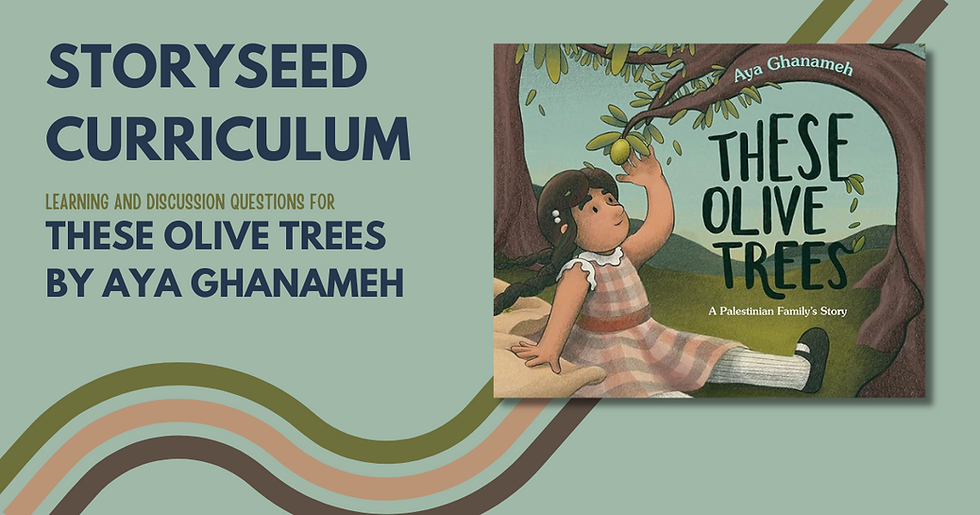
A NOTE FROM ZAPOURA
When my 15-year-old daughter saw this book on the table beside me, she immediately scooped it up and started reading. "These illustrations are gorgeous, mom. I want to eat them up." There is something so visceral about the texture and the dimension of the illustrations mirroring the depth of the story itself. These Olive Trees, written and illustrated by the talented Aya Ghanameh, centers on the metaphor and the reality of the olive tree. Indigenous to Palestine, the olive tree takes many years before it bares substantial fruit, which provides sustenance in the forms of food, oil, and soap. The tree is also a symbol of the rootedness, strength, and hope of Oraib (the main character) and her community. Their strong relationship with their homeland is a stark contrast to the reality of continued war and violent displacement.
But this book is not just for older kiddos. When Oraib's family is forced to relocate from the refugee camp that has been their home, Oraib's act of planting a new olive seed to come back to when she can return home is hopeful, tender, and heartbreaking. Ghanameh's writing does ask kids and adults alike to witness the ominous white smokey hands that represent Al-Nakbha alongside the family love and resilience of Oraib's community.
As a mirror book, this story is an important reflection of Palestinian history and present. As a window book, it's important that young and old readers alike know true history and build empathy.
This is a book that can seed so many conversations that build all of our justice capacity. Recommended for all ages as a read aloud. The curriculum has been written with a target age of 3rd grade and up; it works well for adults, too!
BOOK SUMMARY
It’s 1967, and Oraib’s family has been forced out of their home and into a refugee camp in Nablus, Palestine. We learn about the importance of the olive tree, a source of sustenance and symbol of peace and identity. We see Oraib’s family’s resilience and resistance in the face of being forced to move yet again due to continued violence. In the end, Oraib plants an olive seed with the dream of returning one day to the land that she has called home to see it as a grown tree.
BOOK THEMES
PALESTINE, HOME, LAND, IDENTITY, JUSTICE, FAMILY, RESISTANCE, LOVE, BEING A REFUGEE
ABOUT STORYSEED SOCIAL JUSTICE CURRICULUM
Our curriculum and ongoing practices are rooted in emergent strategy: “the way complex systems and patterns arise out of a multiplicity of relatively simple interactions.” The interactions we have with books, among reading partners, inside classrooms, and within reading communities are relatively simple. What is cultivated from those interactions is something much more complex – lifelong, daily abolitionist, decolonizing, heart/body-centered, and anti-racist practices. These include learning how to make the ground more fertile for ongoing identity, healing, discussion, action, and imagination practices in ourselves and with each other.
Each curriculum includes section summaries, discussion questions, additional learning resources, and a list of books to read next.
THESE OLIVE TREES CURRICULUM SNEAK PEEK
This is a literal snapshot of the curriculum or this book. I hope it gives you a little taste and leaves you wanting more!

GET THE CURRICULUM HERE
Click below to purchase the curriculum for A Map for Fallasteen. Thank you!

Comments